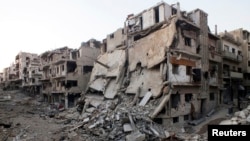WHITE HOUSE —
The White House says it continues to work to address concerns U.S. lawmakers have about President Barack Obama's decision announced in June to send lethal aid to Syrian rebel forces.
Worries in Congress about Obama's plan to send lethal aid, reportedly small arms and ammunition, to the Free Syrian Army emerged in reports by The Washington Post and other media.
The White House announced the aid decision after the U.S. determined the regime of Syrian President Bashar al-Assad used chemical weapons on a small scale against the opposition on several occasions last year.
Publicly, officials avoid speaking in detail about congressional concerns. Comments are limited to observations about the importance of supporting rebels who are facing the Assad regime and its allies, Hezbollah and Iran.
Press secretary Jay Carney said the administration continues to work with Congress to address concerns.
He declined to discuss specifics regarding aid shipments or timelines, but appeared to provide some indication of the message the administration is likely communicating to Capitol Hill.
"We have with our allies and partners worked to strengthen the elements of the Syrian opposition that have in our view the best interests of the Syrian people in mind, and of the future of Syria, and we continue to work with those elements," said Carney.
On Thursday, the Syrian Opposition Coalition expressed deep concern that "elements in the U.S. Congress" are delaying new support to the Free Syrian Army.
A statement attempted to address U.S. congressional concerns about weapons falling into the wrong hands, saying the coalition would ensure that "arms will not reach extremist elements."
In June, the president's deputy national security adviser, Ben Rhodes, voiced confidence about the ability to efficiently channel aid, and prevent it from reaching extremists.
"It has been important to work through them while aiming to isolate some of the more extremist elements of the opposition, such as al-Nusra," he said. "We now have those relationships. We now have that pipeline flowing. We've seen material get into Syria, including to the SMC [opposition Supreme Military Council]."
Moderates versus radicals
Michael Rubin, of the American Enterprise Institute, said, "Even if we are able to separate the wheat from the chaff, when it comes to determining who is moderate versus who is radical, number one, today’s moderates may be tomorrow’s radicals, or number two, the radicals might simply move in and take the arms from the moderates to whom we give them.”
In its reporting, The Washington Post said Obama's lethal aid plan drew objections from members of the House and Senate intelligence committees, which review covert operations.
In a stinging criticism of Obama, The Post editorial board said U.S. allies are "baffled and alarmed" by the president's "fecklessness on Syria," and now his failure "to deliver even on the modest action he decided on."
Worries in Congress about Obama's plan to send lethal aid, reportedly small arms and ammunition, to the Free Syrian Army emerged in reports by The Washington Post and other media.
The White House announced the aid decision after the U.S. determined the regime of Syrian President Bashar al-Assad used chemical weapons on a small scale against the opposition on several occasions last year.
Publicly, officials avoid speaking in detail about congressional concerns. Comments are limited to observations about the importance of supporting rebels who are facing the Assad regime and its allies, Hezbollah and Iran.
Press secretary Jay Carney said the administration continues to work with Congress to address concerns.
He declined to discuss specifics regarding aid shipments or timelines, but appeared to provide some indication of the message the administration is likely communicating to Capitol Hill.
"We have with our allies and partners worked to strengthen the elements of the Syrian opposition that have in our view the best interests of the Syrian people in mind, and of the future of Syria, and we continue to work with those elements," said Carney.
On Thursday, the Syrian Opposition Coalition expressed deep concern that "elements in the U.S. Congress" are delaying new support to the Free Syrian Army.
A statement attempted to address U.S. congressional concerns about weapons falling into the wrong hands, saying the coalition would ensure that "arms will not reach extremist elements."
In June, the president's deputy national security adviser, Ben Rhodes, voiced confidence about the ability to efficiently channel aid, and prevent it from reaching extremists.
"It has been important to work through them while aiming to isolate some of the more extremist elements of the opposition, such as al-Nusra," he said. "We now have those relationships. We now have that pipeline flowing. We've seen material get into Syria, including to the SMC [opposition Supreme Military Council]."
Moderates versus radicals
Michael Rubin, of the American Enterprise Institute, said, "Even if we are able to separate the wheat from the chaff, when it comes to determining who is moderate versus who is radical, number one, today’s moderates may be tomorrow’s radicals, or number two, the radicals might simply move in and take the arms from the moderates to whom we give them.”
In its reporting, The Washington Post said Obama's lethal aid plan drew objections from members of the House and Senate intelligence committees, which review covert operations.
In a stinging criticism of Obama, The Post editorial board said U.S. allies are "baffled and alarmed" by the president's "fecklessness on Syria," and now his failure "to deliver even on the modest action he decided on."





